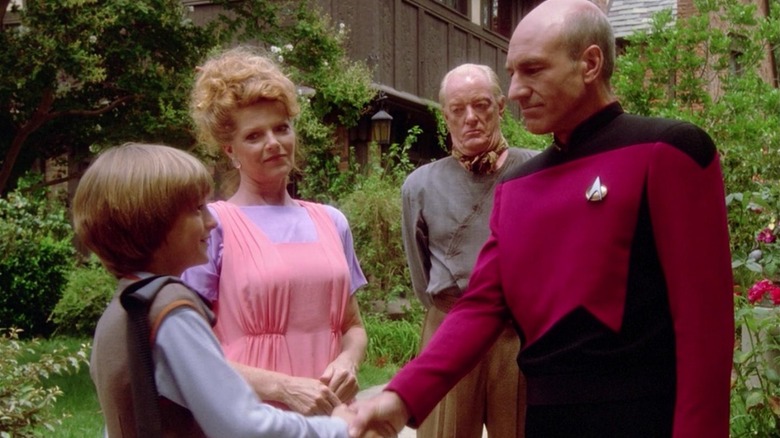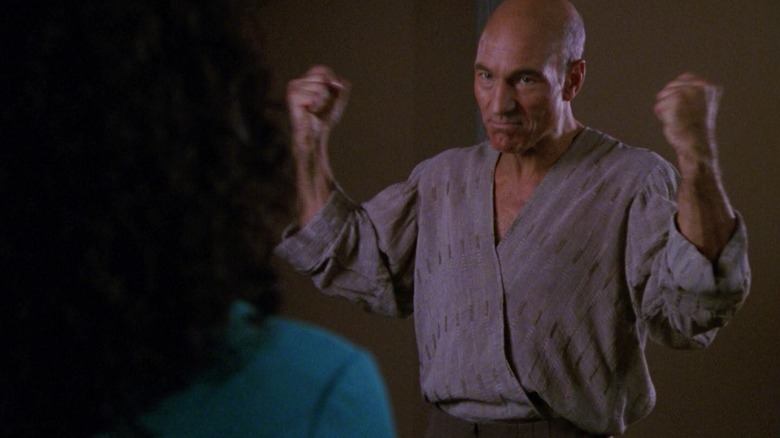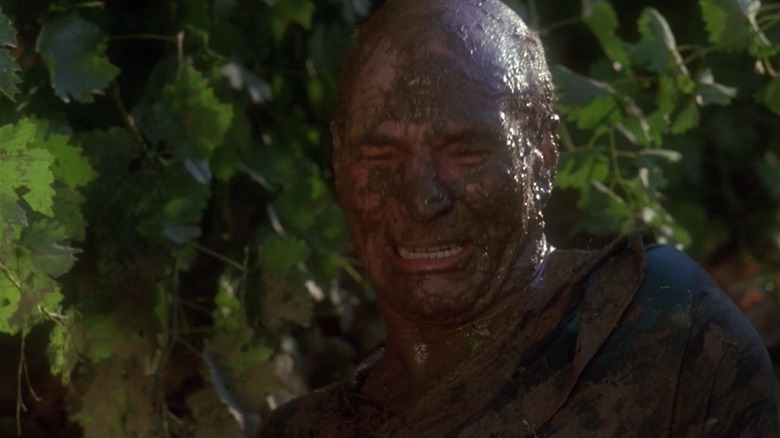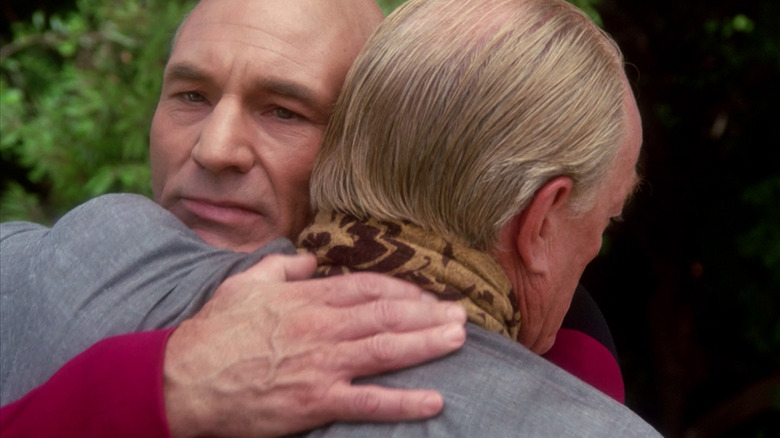Star Trek: The Next Generation's Greatest Two-Parter Has An Essential Third Episode
The most popular episode of "Star Trek: The Next Generation" is likely the two-parter "The Best of Both Worlds" which served as the season finale for the show's third season and the premiere of its fourth. That's the episode wherein Captain Picard (Patrick Stewart) was assimilated by the all-consuming semi-mechanical beings called the Borg. It was up to Commander Riker (Jonathan Frakes) to take command of the Enterprise and fight the Picard-influenced Borg in what turned out to be a disastrous cosmic conflagration. At the end of the episode's second part, Picard was extracted from the Borg's influence and put back in command of the Enterprise.
The episode's penetrating final shot was Picard, wearing medical plates on his face where the Borg machinery had been implanted, staring out of the window of his ready room, pondering the harrowing experience he survived. The galaxy is no longer an exciting frontier to explore. It is now a place of damage, of pain, of having one's individuality rent asunder by a cold, emotionless machine intelligence.
The episode that immediately followed was called "Family" (October 1, 1990), and it follows the Enterprise's senior staff as they are finally allowed to take some time off. After the Borg incident, everyone was in the mood to temporarily vacate their usual space adventures and have a few quiet conversations with their closest relatives. Picard begins the episode talking to Counselor Troi (Marina Sirtis) about his Borg experience, and that the last few months of therapy have been good for him. He's now ready to visit his brother Robert (Jeremy Kemp) in France.
"Family" is actually a direct sequel to "The Best of Both Worlds" and a vital epilogue to Picard's Borg trauma. Picard's time with his sour, estranged brother left him wailing out his unhealed pain.
'Family'
In "Family," Trekkies learned that Picard grew up in a French château in the countryside and that his brother still works in a generations-old vineyard. While Picard has been galavanting about the galaxy in a high-tech spacecraft, his brother still works the land, relying on technology as little as possible. In a world of plentiful food replicators, it seems it has become a point of pride to learn how to actually cook your own meals, and Robert clearly still clings to that pride. He argues that replicated wine is swill and doesn't taste as good as the real deal.
Picard and Robert, it seems, haven't communicated much and don't really like each other. Picard is fond of his nephew René (David Tristan Birkin) and sister-in-law (Samantha Eggar), but he and Robert could just as easily not speak and be fine with it. While working the fields and taking in the French sun, Picard is approached by an old colleague with a job. Picard is invited to leave his career as a starship captain and take command of a deep-sea exploration station at the bottom of the Pacific. Picard was always interested in marine life, and he beings considering the career change. Not only will he no longer be in space, but he'll be deep below the sea where he won't even be able to see the stars. This is presented as a palpable and peaceful path forward for the character. Jean-Luc could have left the show at that moment.
Of course, Trekkies will intuit right away that Picard is only considering the deep-sea job as a response to his wartime trauma. It would legitimately interest him to work in the ocean, but it's easy to see that something is going unexamined.
Picard's outburst
Tensions between Picard and Robert become increasingly heated throughout "Family," and the two will end up coming to blows. The brothers punch each other, argue about how much they hated growing up each other, and fall into the mud, hitting and yelling. During the fight, Picard sits up in tears. There is something more than familial resentment. All of Picard's comes out in a burst of tears. He was meant to be strong, and the Borg took everything from him. To quote:
"You don't know, Robert, you don't know. They took everything I was. They used me to kill and to destroy, and I couldn't stop them! I should have been able to stop them! I tried. I tried so hard. But I wasn't strong enough! I wasn't good enough! I should have been able to stop them. I should, I should."
Picard always longed to escape from his family farm and always looked up at the stars. The stars, years later, hurt him in ways no one can imagine. Despite his claims to Counselor Troi at the beginning of the episode, Picard is not strong. He has a long way to go. It's one thing for viewers to hear that Picard is all well and good after his traumatic experience, but it's quite another to go through the healing process with him. "Family" permits audiences to heal with Picard.
One might presume that after "Family," Picard continued to talk to Counselor Troi and that his healing would continue apace. But for a moment, audiences were permitted to see Picard admitting how weak he felt.
Picard stays in space
After Picard's outburst, Robert wasn't touched, but he did understand his brother better than he ever had before. "So," he says, "my brother is a human being after all." It seems that Picard's habit of being aloof with his crew extended to his family. With his teary, mud-soaked confession, Picard came down from Olympus. Robert says:
"This is going to be with you a long time, Jean-Luc. A long time. You have to learn to live with it. You have a simple choice now — live with it below the sea with Louis, or above the clouds with the Enterprise."
Trauma cannot be outrun. It can only be confronted and handled and healed from. Picard and Robert then return to the château to share some wine and get a little too tipsy in the afternoon. It's a cathartic drink.
One might assume that psychiatric help in the 24th century is more advanced than in the present and that healing processes operate more swiftly. Picard likely continued his meetings with Troi for a time after "Family." Only a few years later, Picard encountered another Borg (in the episode "I, Borg"), and he was able to face the situation without flinching. In "Descent," he confronted the Borg again, and he was clearly back on his feet, no longer frightened.
For the 1996 film "Star Trek: First Contact," the writers decided, somewhat arbitrarily, that Picard was still wounded and now bafflingly driven by violent revenge. "First Contact" is a slick, exciting action film, but Picard is completely out of character. The calm, judicious, and ostensibly healed Starfleet captain was now a screaming, murderous action hero. It's not a good continuation of the Borg story. "Family" is the conclusion we needed.



